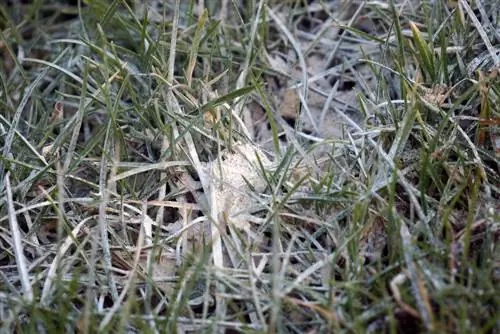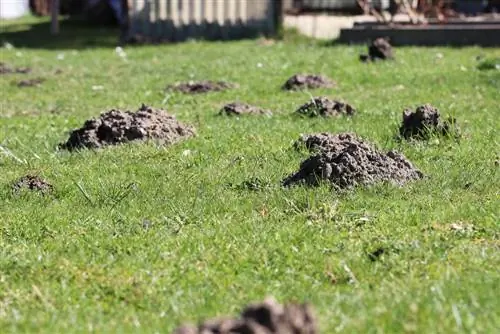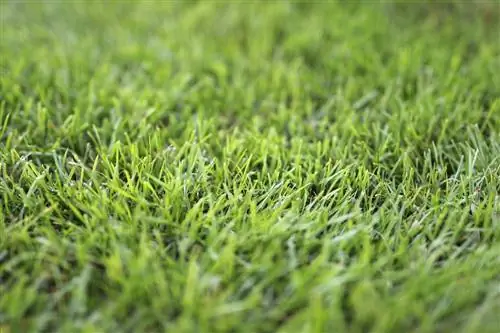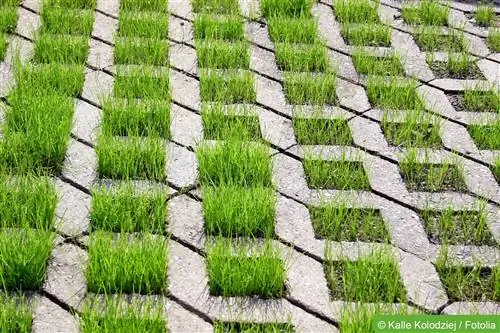- Author admin caroline@plants-knowledge.com.
- Public 2023-12-17 03:39.
- Last modified 2025-06-01 06:48.
In order to maintain a beautiful, well-maintained lawn, it must be fertilized regularly. This is particularly important because the individual blades of grass can hold their own against invading weeds and these cannot take over the lawn, otherwise it will quickly turn into a natural meadow. The question now arises as to which fertilizer is the right one, should chemically produced mineral fertilizer or, better yet, organic fertilizer be used? Among other factors, the timing of fertilization is also crucial.
Mineral fertilizer - definition
Mineral fertilizer is mostly used for the cultivation and maintenance of lawns. This fertilizer is largely made from potassium, phosphorus and nitrogen. Mineral fertilizers are actually by-products from mineral mining. These are processed through chemical processes for use as fertilizer. If the lawn shows signs of deficiency, it can be fertilized with mineral fertilizer. These can be recognized, for example, by a yellow lawn, or if there are more weeds on the lawn than blades of grass. Mineral fertilizers are commercially available as follows:
Full-time fertilizer
- all nutrients are available in sufficient quantities
- Supplementary fertilizers are not necessary
- As a rule, it is advisable to use such a full-time fertilizer
Fertilizer for specific nutrients
- these fertilizers are always manufactured in a specialized manner
- multiple fertilizers may need to be used
- there are different forms of administration for all mineral fertilizers
as granules
- must first react with water to get into the ground
- Lawn can burn under certain circumstances
- Water the lawn immediately after fertilization
as liquid fertilizer
- is administered directly with the irrigation water
- Nutrients are already contained in liquid form
- get into the roots of the lawn more quickly
- liquid fertilizer is often more expensive than granules
Tip:
If things have to happen quickly because the lawn is suffering from an acute lack of nutrients, then the mineral liquid full-time fertilizer is certainly the best choice to quickly regain balance. Because the mineral fertilizer helps quickly due to its composition, it works even faster in the liquid state.
Application of mineral fertilizer
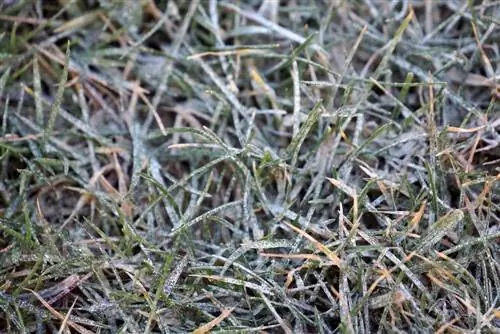
Mineral fertilizers have been used in one form or another for over 150 years. It is often used, especially in productive cultivation, as the yield can be increased through constant supply of nutrients. However, it can also happen that weeds and undesirable plants are encouraged to grow by the addition of fertilizer. For this reason, the mineral fertilizers available on the market today are enriched with additives that are intended to reduce weeds. However, if this fertilizer is used too often, the natural humus layer can be reduced. Over-fertilizing the lawn should therefore be avoided at all costs. Furthermore, the following measures should be taken during and after fertilizing the lawn:
- Fertilizing three times with mineral fertilizer is ideal
- Spring, summer and autumn
- different cycles require different nutrients
- Phosphorus ensures root growth
- Potassium provides strength against illness and eventual dehydration
- Nitrogen causes rapid new leaf formation and rapid growth
- If granules are used, do not sprinkle on the blades of grass
- these could burn
Organic fertilizer - definition
Organic fertilizer used to be the only fertilizer used in agriculture. Then as now, farmers mixed and produced it themselves from plant and animal waste, liquid manure and manure. This can be compared to the compost known to hobby gardeners. Therefore, homemade compost fertilizer is also an organic fertilizer. Industrially produced organic fertilizers are also available commercially. But these also retain their natural composition; no chemicals are used here. Horn shavings and horn meal are also organic fertilizers, as is guano, which has also proven itself as a long-term fertilizer. Organic fertilizers therefore primarily provide nitrogen and phosphorus.
Application of organic fertilizer
If a new lawn is being created, it is recommended to enrich the soil with compost and horn shavings. In this way, all the necessary nutrients get into the soil, which also receives the necessary microorganisms that are also in the compost and becomes rich in humus. When fertilizing later, when the lawn has already grown, fertilizing with compost is no longer recommended, as it can no longer be buried under the lawn. Therefore, long-term lawn fertilizer should be purchased commercially for pure lawn fertilization with organic fertilizer. These are available in liquid or granular form. In order to supply the lawn with all the nutrients, combination preparations for organic fertilizers are often necessary.
The pros and cons
Disadvantages of mineral fertilizers:
- Pollution of groundwater by nitrate
- Increase in nitrates in food
- Heavy metals accumulate in the soil
- the soil can become salinized
- Humus decreases
- Microorganisms in the soil are reduced
- Groundwater is enriched with phosphate
- Production is very expensive
- Energy required in production is very high
- can cause he alth damage
- keep away from children
- a fertilized pasture can only be used again after three to seven days
Disadvantages of organic fertilizers
- The effectiveness after fertilization only sets in later
- Not all nutrients are supplied with a single fertilizer
- often different fertilizers have to be given at the same time
- organic fertilizers in the form of compost are not so suitable for a lawn
- can be difficult to lift on a dense lawn
- organic fertilizers do not provide the lawn with enough nutrients
- it needs to be fertilized with other fertilizers
- otherwise the lawn can become covered in moss
Benefits of mineral fertilizers
- quick effectiveness after the measure
- a few days later the lawn is strengthened
- Nutrients are quickly dissolved in the soil
- These are quickly absorbed by the lawn
- Deficiency symptoms can be counteracted so quickly
Benefits of organic fertilizers
- there is a sustainable supply of nutrients to the soil
- the organic substances were decomposed by microorganisms
- organic fertilizer can be made yourself
- improves the soil structure
- the earth is becoming more fertile
- more environmentally friendly, as there are no chemical additives
Tip:
As can be seen from the pros and cons of the various fertilizers, both have advantages and disadvantages that should be taken into account. A good combination of mineral and organic fertilizer would therefore be the ideal solution. The mineral fertilizer is applied in one season, while the organic fertilizer could be used the next time.

Conclusion
It is not easy to say which fertilizer is more suitable, since organic fertilizer is definitely more environmentally friendly, but mineral fertilizer supplies the lawn with far more nutrients. A combination of both fertilizers is therefore advisable. When preparing to plant a new lawn, compost could be mixed in first. During the next fertilization, however, the mineral fertilizer is used. So that there are no deficiencies in microorganisms and humus in the soil, organic fertilizer is used again in between, which this time should come from stores so that the soil can absorb the nutrients more quickly. Adding pure compost to well-grown lawns is not recommended.

